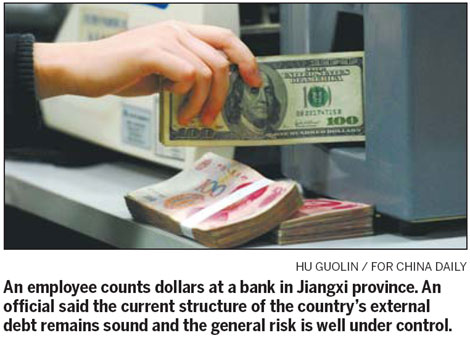Risks of nation's external debt are limited, SAFE official says
Updated: 2011-12-16 07:34
By Li Xiang (China Daily)
|
|||||||||

BEIJING - The overall risk of China's external debt is limited, but regulators should be alert to the country's rapidly rising short-term external debt, a senior official at the State Administration of Foreign Exchange (SAFE) said on Thursday.
Outstanding external debt has reached $642.5 billion, up $253.3 billion from 2007, before the global financial crisis, according to Li Chao, deputy head of the SAFE.
As the eurozone sovereign debt crisis has worsened, speculation has grown that China might also face fiscal problems and its external debt might have a negative impact on the economy.
But Li said that the current structure of China's external debt remains sound and the overall risk is well under control, given the nation's $3.2 trillion in foreign exchange reserves.
Li said that China should pay special attention to its surging short-term external debt, which accounts for 72 percent of its total external debt.
More than 50 percent of the short-term external debt is in trade credit and financing, he said.
"The amount of short-term debt is well above the international alert level of 25 percent," Li said at an economic forum in Beijing.
"The regulation of short-term debt is needed as China is pushing forward with opening its capital account," he added.
Li said that the major contributors to short-term external debt were rapid trade growth, expectations for the yuan's appreciation and interest-rate differentials between foreign currencies and the yuan.
Analysts said that short-term capital movements in the form of external debt are usually difficult for the regulator to manage, and such capital flows could increase the volatility of domestic asset prices.
"Highly active foreign capital might flow in or out of certain asset markets, which could push up or drag down the prices," said Zhao Xijun, deputy director of the Financial and Securities Institute at Renmin University of China.
Zhao added that yuan-denominated external debt could complicate the nation's monetary policy and liquidity management as China encourages cross-border trade settlement in yuan.
China is the world's fourth-largest holder of short-term external debt after Hong Kong, Japan and Malta measured by scale.
The amount of such debt has been growing at a pace of 18.2 percent annually, higher than the 11.7 percent growth rate of total external debt, according to SAFE.
China Daily
(China Daily 12/16/2011 page13)











